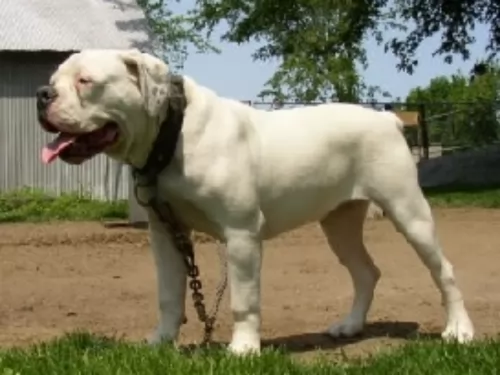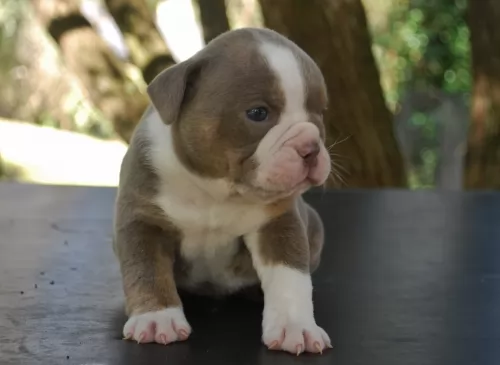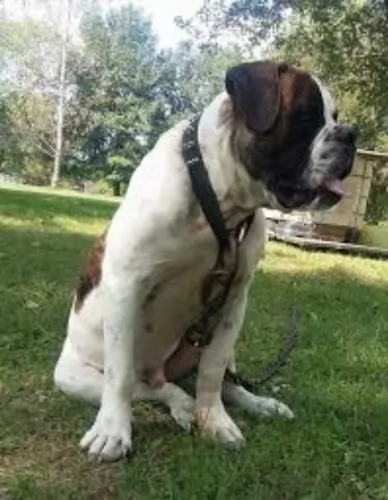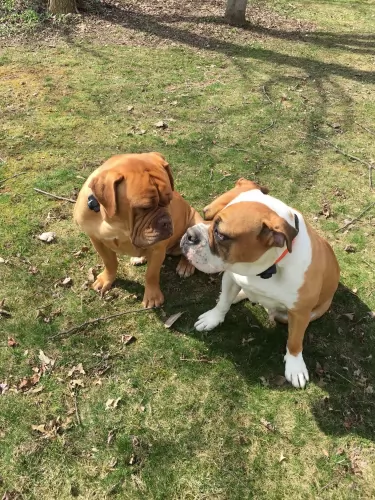 Petzlover
PetzloverHermes Bulldogge is originated from United States but Southern Hound is originated from United Kingdom. Hermes Bulldogge may grow 8 cm / 3 inches shorter than Southern Hound. Hermes Bulldogge may weigh 27 kg / 60 pounds more than Southern Hound. Both Hermes Bulldogge and Southern Hound has almost same life span. Both Hermes Bulldogge and Southern Hound has almost same litter size. Both Hermes Bulldogge and Southern Hound requires Low Maintenance.
 The Hermes Bulldogge is not a breed in itself, but is actually a line within the English Bulldogge line. The Hermes family in the United States bred this line for several years. The Hermes Bulldogge line is the largest of the re-creations from the English Bulldogge. They are inspired by the arena dogs from the days of the Roman Empire. Greg and Linda Hermes have bred healthy, smart, resilient and agile dogs. The desire of the Hermes was an attempt at recreating the 17th century dog.
The Hermes Bulldogge is not a breed in itself, but is actually a line within the English Bulldogge line. The Hermes family in the United States bred this line for several years. The Hermes Bulldogge line is the largest of the re-creations from the English Bulldogge. They are inspired by the arena dogs from the days of the Roman Empire. Greg and Linda Hermes have bred healthy, smart, resilient and agile dogs. The desire of the Hermes was an attempt at recreating the 17th century dog.
They used a variety of breeds to create the Hermes Bulldogge, most of whom are never disclosed. Some of the dogs that were probably used include: English Mastiffs, American Bulldogs, Old English Bulldogges, and pit Bull Terriers. This family of dogs are playful, friendly, and good family dogs. They have a strong prey drive which makes them good hunters but not as good around other small animals or small children. The Hermes have been breeding the Hermes Bulldogge since since 1983. The puppies are all hand raised, child friendly with great health.
When discussing the Hermes Bulldogge, one must go back to the root of the English Bulldogge. That breed comes originally from England and various lines have been recreated by various breeders. The breeding of the Old English Bulldogge with Mastiffs and Pits lead to other lines that the breeders called Old English. But most fanciers believe that only two lines of the original Old English Bulldogge remain and that is the Leavitt and the Hermes.
Some form of bulldog has been in existence since 700 years ago and as it was mixed with a variety of other breeds it took on other forms over time. The English Bulldogge was a definite couch potato. Instead of being bred for a job or look, the Bulldogge was developed with temperament, ability and health in mind. This has made for a great family dog without a lot of veterinarian bills.
The Southern Hound hails from England and is a breed of dog that existed sometime in the 19th century.
There isn’t much information available as to the time the dog became extinct. Some people believe that other breeds were bred with the dog until the true Southern Hound bloodline no longer existed. It was a breed of scent hound, and had an excellent sense of smell.
Known also as the Old English Hound, it was during the 18th century that the Southern Hound’s popularity waned and other kinds of hounds became more prominent.
While the Southern Hound has been extinct for decades, there is still some of this dog breed found in modern day breed.
It s believed that the Southern Hound has been used in the development of the Beagle and the Bloodhound as you can see the similarities.
 The Hermes Bulldogge, much like the original Olde English Bulldogge, is taller, healthier, more athletic than the original English Bulldog. They are medium height, with a large head, a strong body and a deep, wide chest and broad shoulders. Tails might or might not be docked but the ears are never docked. They n have a moderate amount of wrinkles and a longer, less smashed face than the original. It is easier for the Hermes Bulldogge to breath, to fly and to live in warmer environments that it is for the English Bulldogge. His eyes are lower in his head but in the front center.
The Hermes Bulldogge, much like the original Olde English Bulldogge, is taller, healthier, more athletic than the original English Bulldog. They are medium height, with a large head, a strong body and a deep, wide chest and broad shoulders. Tails might or might not be docked but the ears are never docked. They n have a moderate amount of wrinkles and a longer, less smashed face than the original. It is easier for the Hermes Bulldogge to breath, to fly and to live in warmer environments that it is for the English Bulldogge. His eyes are lower in his head but in the front center.
They are very dark almost black. Eyelids should cover the white of the eye and they have rounded cheeks. They have a short muzzle and short face. Broad, thick lips finish out the face with very large, square, broad jaws.
The Southern Hound was a large, solidly built, deep chested dog with a square head and a longish muzzle. He stood at between 58-71 cm in height and weighed 25 – 41kg.
The Southern Hound had long, wide floppy ears, much like the Basset Hound of today. The tail was fairly long and curved upright. It was known for its deep melodious voice, much like the Bloodhound we have today.
It had excellent scenting abilities and was used to follow the trail of its prey. The coat of the Southern Hound was short and smooth and it is believed that the most common colors for the coat were white with black or brown markings, making it a tricolor dog.
Used to being on the hunt with other dogs, there is no doubt that the Southern Hound wasn’t aggressive towards other dogs and that he knew how to get along with them. It’s a dog that was dedicated to to the hunt and was bred to work, known for its stamina and endurance.
The dog didn’t possess strong herding or protective instincts and it is thought that it wasn’t kept as a companion dog. Because of the breeds used to develop this dog, it is assumed that it was a non-aggressive, friendly dog.
 If socialized properly this line of bulldog is harmful to me.
If socialized properly this line of bulldog is harmful to me.
Strong and athletic, his strength and stamina.
He is not very adaptable. Apartments are not good for this dog. He needs to run and if possible to hunt.
He is very intelligent but stubborn which affects his learning ability.
The Southern Hound is no longer in existence, which is a pity as it seems as though he may have made an excellent pet in modern times.
They were a playful breed, loyal, gentle and affectionate and no doubt made a good watchdog too, although it is thought that his protective instincts weren’t good.
They aren’t dogs recommended for city living, but it seems according to the few records there are of this dog that he could have made a reliable, loving pet to have around.
 The Hermes Bulldogge is healthier than most bulldogs. His face is not as smashed and he is not as wrinkled. He can breathe easier than other Bulldogs. The two major concerns are hip dysplasia and bloat.
The Hermes Bulldogge is healthier than most bulldogs. His face is not as smashed and he is not as wrinkled. He can breathe easier than other Bulldogs. The two major concerns are hip dysplasia and bloat.
Hip Dysplasia also some elbow dysplasia: can cause lameness and arthritis
Terminal unless treated immediately. Can be prevented by not feeding large meals before or after heavy exercise.
The Southern Hound had drop ears which would have made him prone to ear infections. This is because unlike dogs with erect ears, air isn’t able to circulate into the ear and the inside of the ear become a breeding place for bacteria.
The dog may have had to deal with Cherry Eye too. This eye problem affects the tear gland in the third eyelid. It needs to be treated so as to avoid long term eye problems. This is also because exposure of the tissue can bring on swelling, inflammation and infection.
 When feeding a Hermes Bulldogge puppy be sure you feed puppy meal for bulldogs or medium dogs. For first year fee 2-4 times a day 2 cups food.
When feeding a Hermes Bulldogge puppy be sure you feed puppy meal for bulldogs or medium dogs. For first year fee 2-4 times a day 2 cups food.
Feed the adult a solid adult dry food. 2 cups twice a day.
Better health than most lines of Bulldogs. Few wrinkles and less problems breathing as he doesn’t have a smashed face.
He doesn’t need a lot of exercise but daily walks and lots of play time. He can enjoy Lure Coursing obedience, agility and obedience
Because this dog was once used as a hunting dog, they were accustomed to large open spaces. He would have required a fair amount of exercise. They would have needed a walk every day if he wasn't involved in a hunt that day.
The Southern Hound had a short coat and in those days he probably would have needed to be brushed once or twice a week.
The Southern Hound would have required top quality food to support his energy. If in that time there has been commercially manufactured food, it would have had to be the better quality ones. Today if you were feeding the Southern Hound you would check out the ingredients on the packaging and go for the dog foods with wholesome, natural ingredients in them.
No doubt the owners of these dogs provided their dogs with raw and cooked meat. If you had a Southern Hound today you would try to include some home-made food for him which would be simply mixed into the dry kibble twice a week. Boiled chicken, brown rice or pasta and spinach, sweet potatoes and carrots is super nutritious.
The Southern Hound would have required a constant supply of fresh, cool water within his reach.